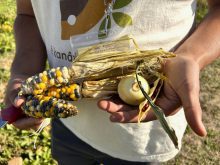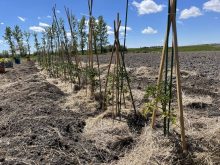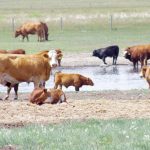This story has been reposted in recognition of the National Day for Truth and Reconciliation on Sept. 30. For more stories of Indigenous farming, food sovereignty, challenges and triumphs in the ongoing work of reconciliation, see our Truth and Reconciliation landing page.
Food is expensive in the rural North.
In 2018, a litre of skim milk was worth $1.55 in Winnipeg and $2.23 in a northern Indigenous community with an all-weather road. Without the road, a resident would pay $2.65.
Read Also

Manitoba sunflower plant gets local owners
Scoular’s sunflower and bird feed plant in Winkler, Man., bought by Orenda Commodity Services Ltd. out of Ste. Agathe.
It’s the same story for produce. Carrots cost $1.82 in Winnipeg, $3.02 in road-accessible northern communities and $4.46 in more remote areas.
The figures come from University of Manitoba researchers, who set out to survey food availability and prices across 22 communities and put numbers to the food gap in northern Indigenous communities. They found that fresh fruits, vegetables and dairy combined took up less shelf space in northern grocery stores than the section devoted to potato chips and pop.
The Niriqatiginnga program was born because of those types of numbers. Niriqatiginnga, meaning “come eat with me” in Inuktitut, is devoted to innovation in northern food systems.
Its website says it hopes to tackle food insecurity in northern Indigenous communities through collaboration with farmers, food producers and innovators. It connects with youth and elders and incorporates traditional knowledge.
The program is meant to engage Indigenous communities with their food system and foster connections with food production. Participants plan and co-design research and developed an online marketplace for social entrepreneurship programming.
As of late June, it’s one of 26 Indigenous agriculture projects that will get a new wave of government support.
Why it matters: The provincial and federal government say the funding will boost Indigenous-led projects and enhance food security while supporting traditional food systems and promoting economic growth and reconciliation.
On June 21, federal agriculture minister Lawrence MacAulay and Manitoba agriculture minister Ron Kostyshyn announced $1.52 million for Indigenous agriculture projects in the province and across Canada. Funds will come from the Sustainable Canadian Agricultural Partnership.
One stream of the partnership, the Indigenous Agriculture and Relationship Development program, was earmarked to boost food security, provide training and resources and increase Indigenous participation in Manitoba’s agricultural and agri-food landscapes.
“Funding for agricultural projects led by Indigenous Peoples is a crucial step towards building a more inclusive, sustainable and climate-resilient food system,” MacAulay said in a press release.
“By continuing to diversify and include traditional food systems, we can help to address food security for folks right across the country and build an even stronger sector.”
Kostyshyn said agriculture and food production are key economic drivers in Manitoba and it is vital that Indigenous communities benefit from that.
“We’re supporting communities to bring back and expand traditional ways of growing food and address food insecurity, and we’re working with them to train workers and grow businesses in the agriculture sector.”
Funded projects
It’s the latest round of support for Niriqatiginnga. The program started as a pilot, also funded through S-CAP, in 2023-24, spearheaded by Inuit-owned freight company Arctic Buying Company Kivalliq Inc., based in Winnipeg.
“We recognize so many people are on budgets … and we introduced hampers. That’s one of the things that’s taken off for us,” said Tara Tootoo Fotheringham, the freight company’s CEO. “We have emails a few times a week from some of the reserves, where they heard our hampers are really good.”
The reserves pick the amount and type of hampers they’d like. The company ships via the most direct route to ensure freshness and keep costs comparable to the rest of the province.
“I believe wholeheartedly that a jug of milk in Tadoule Lake should be the same price as a jug of milk in Alert (Nunavut) or Arctic Bay (Baffin Island),” Tootoo Fotheringham said. “They shouldn’t have to pay more for that food.”
By February, the project had evolved into a non-profit organization. Activities culminated successfully in June with a final presentation at the 2024 Arctic Congress in Bodø, Norway.
Ensuring access to fresh, healthy food is part of the work of reconciliation, Tootoo Fotheringham said.
“How do we get back control of what we put into our bodies? How do we get back in control of knowing where we source our product from? For me, that’s where my passion lies. This is really about reconciling our relationship with food.”
She hopes the program will work with more Indigenous farmers in the future. A meat and produce subscription box service is another goal.
Elsewhere in the province, central Manitoba’s Long Plain First Nation is expecting funds for its community wellness initiative on hunting, gathering, foraging and processing. That program aims to improve food harvest and preservation skills to ensure year-round availability.
Aki Foods, a branch of Aki Solutions Group dedicated to food-centred economic development and employment in First Nations communities, will receive funds for equipment to boost productivity and quality of crops, which include grains, vegetables, fruits, herbs, poultry and eggs.
Applications for the Indigenous Agriculture and Relationship Development program are open until July.
Other streams
MacAulay announced other, non-S-CAP related funding to bolster local food in New Brunswick’s Woodstock First Nation. That June 25 announcement slated up to $62,124 for the community’s agriculture through the federal Local Food Infrastructure Fund.
The community will buy a tractor and greenhouse equipment with the money, and pursue an irrigation system, cold storage and a cleaning station. The project builds upon a previous investment of $41,074, which helped the First Nation add garden space and build three greenhouses to increase food availability for community members.
Woodstock First Nation has expanded its capacity to provide nutritious food, said Chief Tim Paul, in a press release.
“As longstanding stewards of the land, we profoundly recognize the urgent need to address food security comprehensively. By bolstering our distribution capabilities, we aim to create a lasting legacy for generations to come.”
Paul added that the funding leaves room for a holistic approach to food security that fosters healthy diets and promises sustainable agricultural practices.


















